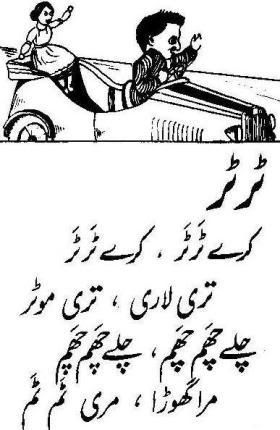 On these pages at ATP, we’ve extensively covered Pakistani poets and poetry. One thing which I think has lagged so far is the Pakistani poetry for children. This post is an attempt to introduce one of most famous poets of Pakistan who has written extensively children. He is Sufi Ghulam Mustafa Tabassum.
On these pages at ATP, we’ve extensively covered Pakistani poets and poetry. One thing which I think has lagged so far is the Pakistani poetry for children. This post is an attempt to introduce one of most famous poets of Pakistan who has written extensively children. He is Sufi Ghulam Mustafa Tabassum.
My mother recently mailed me one of his books called ‘jhoolne’ for my son. For the past two nights I’ve been reading this book to my son at bed time and it has also taken me to a ride through memory lane, and hence the motivation to write this post.
The title poem to the right here is called ‘tar tar’. Sufi Tabassum is famous for using sound effects in his poems to get children’s attention. This poem uses sound (tar tar) of old cars (motor) as well as sound (cham cham) of a horse cart (tam tam). In 4 simple lines Sufi Tabassum has created this melodious masterpiece for children which is ‘hum-wazan’, rhyming and easy to remember.
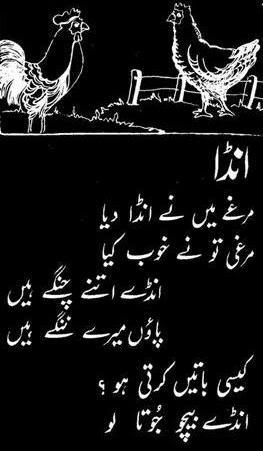 More than a generation has grown up reciting and remembering his poems by heart. His poems can be found in text books across Pakistan, in children’s magazines as well as in audio media. One of the most famous characters of Sufi Tabassum‘s poems is a boy named ‘tot batot’ which is now a household name across Pakistan.
More than a generation has grown up reciting and remembering his poems by heart. His poems can be found in text books across Pakistan, in children’s magazines as well as in audio media. One of the most famous characters of Sufi Tabassum‘s poems is a boy named ‘tot batot’ which is now a household name across Pakistan.
The poem to the left is titled as ‘anda’ (egg) and it is another of my favourites. For our English readership, I want to give an approximate translation. A hen is telling a rooster that she has laid an egg. While she commends herself on this feat of laying beautiful eggs she also complains that despite producing beautiful eggs she remains bare feet. To this dilemma the rooster suggests to hen to sell her eggs and buy shoes for herself. A very simple story like this, told in rhyming Urdu makes people of all ages smile and remember this poem for ever. This is what Sufi Tabassum is most famous for. He talks to children in their simple language.
Following poem is called ‘munna aur laddoo’. In very simple language it talks about a ‘laddoo’ (sweets) which has attracted attention of two young boys (munna(y)).
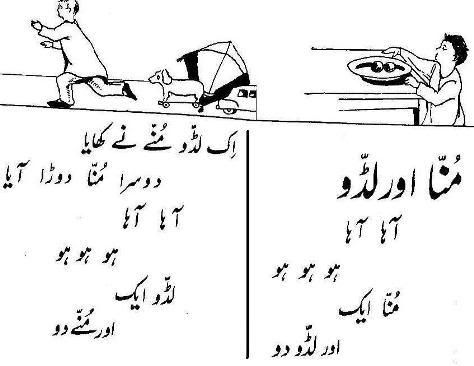
Sufi Ghulam Mustafa Tabassum was born is Amritsar (India) on August 4, 1899. He got his education from Church Mission High School Amritsar, Khalsa College Amritsar, FC College Lahore (B.A) and Punjab University Lahore (M.A and B.T).
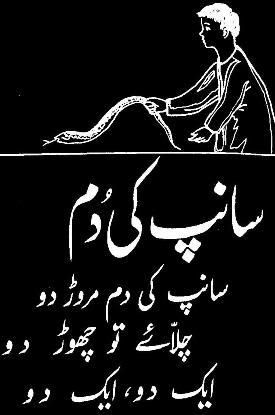 He taught at Central Training College, Lahore (1927-31) and Government College, Lahore (1931-1954). He retired from Government College as the head of Urdu and Farsi Department.
He taught at Central Training College, Lahore (1927-31) and Government College, Lahore (1931-1954). He retired from Government College as the head of Urdu and Farsi Department.
The collection of poems shared here come from his book called ‘jhoolne‘ which was first published in 1958. In the begining of this book, dated as January 1, 1958, Sufi Tabassum mentions Patras Bukhari as one of his respected teachers and friends. Patras Bukhari has actually indeed written the preface of ‘jhoolne’ and towards the end of it he prays for Sufi Tabassum in following words:
dua hai ke Sufi Tabassum ka ye bachpan hamesha qaayem rahe!
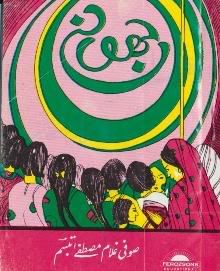 Patras Bukhari‘s preface is dated as written on June 5, 1946 in Delhi which means the first collection of ‘jhoolne’ must’ve appeared around that time.
Patras Bukhari‘s preface is dated as written on June 5, 1946 in Delhi which means the first collection of ‘jhoolne’ must’ve appeared around that time.
The title of the 1958 edition of the book (shown to the left) is designed by Chughtai and is published by Ferozesons Limited.
Between 1954-1960, Sufi Tabassum was involved with Khana Farhang-e-Iran at Lahore as well as with teaching Urdu to Bengali students in Civil Services Academy and Finance Services Academy.
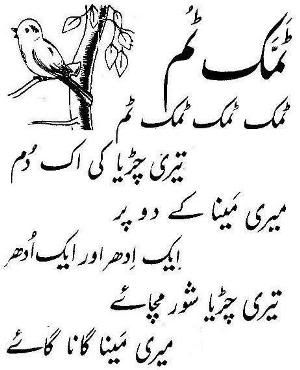 He acted as an editor of the magazine ‘lail-o-nahar’ from 1961-1963 and then got busy ar Radio Pakistan, Lahore.
He acted as an editor of the magazine ‘lail-o-nahar’ from 1961-1963 and then got busy ar Radio Pakistan, Lahore.
In ‘jhoolne’ Sufi Tabassum wrote this famous poem about a funny boy called ‘tot batot’. As mentioned above too, this character became an instant household name in Pakistan. 24 years after ‘tot batot’ first appeared in jhoolne, Sufi Tabassum wrote a new book with the title ‘tot batot’. On my last visit to Pakistan, I especially went to Urdu bazar to buy this book for my son. The preface is written by Sufi Tabassum in his own handwriting and it is dated to be written on September 6, 1970 at Samanabad, Lahore.
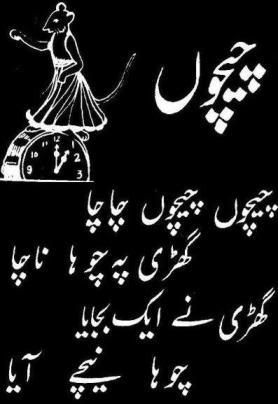 To the left is Sufi Tabassum’s another famous poem called ‘cheechoN’. It appears in many children books as well as school text books across Pakistan. Patras Bukhari has written about this poem in following words:
To the left is Sufi Tabassum’s another famous poem called ‘cheechoN’. It appears in many children books as well as school text books across Pakistan. Patras Bukhari has written about this poem in following words:
“When children read ‘cheechoN cheechoN chaacha, ghaRi pe chooha naacha’, they enjoy it. The elders however may say that we have never seen the word ‘cheechoN’ in any dictionary. And if ‘chaacha’ is meant for the word ‘chacha’ then it is not a decent way of calling an uncle. And why has a mouse danced on a clock? What lesson are we giving to children? etc etc.
These questions are all very reasonable but they come from those people who have forgotten their own childhood. May be they come from people who have decided on not to repeat those things which had made their own childhood enjoyable. Thank God that Sufi Tabassum has been blessed by such wisdom where he can talk to children in their own words and sounds. He recognizes a child’s mind as this strange place where snakes dance on the trees, cats eat berries and tar tar, cham cham, tam tam make such a melodious mix that one cannot learn those even from ‘taan sain’ at an older age.
During the last years of his life, Sufi Ghulam Mustafa Tabassum had dedicated his life to the research on ‘Iqbaliat’ (study of Allama Mohammad Iqbal). On the occasion of 100 year celebration of Allama Iqbal, Sufi Tabassum wrote, edited and produced (tasneef) several books on Allama Iqbal. In 1978 He went to Islamabad to attend a function on Allama Iqbal, but on his return he passed away at Lahore Railway Station. The date of his sad demise was February 7, 1978.
The books that he wrote for children include:
1. jhoolne
2. suno gap shap
3. tol matol, and
4. tot batot



















































My favorite page on this site … I have come late to the party having discovered it a couple of years ago in search of Sufi Tabassum’s works.
When I feel hopeless for Pakistan, which is saying something since my dad used to call me an incorrigible optimist, I wander over here checking out it’s offerings imagining myself at a phalwala’s thela sampling slice of amrood …
Its great. Love this poetry. I read it for my children.
:) had a smile all the time reading it.
we want urdu poems for class 1 level